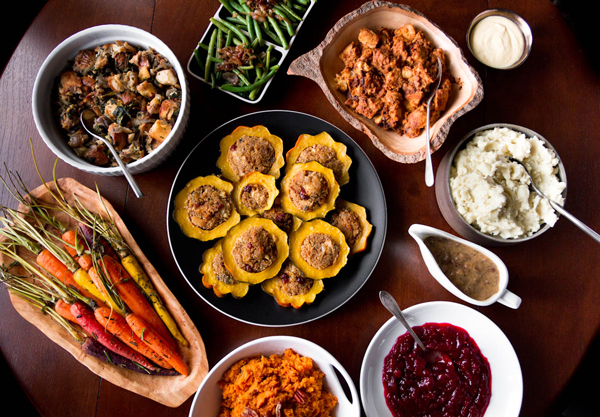Guests with Special Dietary Needs? No Problem!
/ I'm a longtime vegetarian (and a one-time vegan), and I grew up in Texas, where meat is king. So I know the decisions about what we eat and why can be personal, sensitive, and sometimes a little misunderstood. This can become particularly relevant around the holidays, when the dietary choices of guests and hosts may differ wildly.
I'm a longtime vegetarian (and a one-time vegan), and I grew up in Texas, where meat is king. So I know the decisions about what we eat and why can be personal, sensitive, and sometimes a little misunderstood. This can become particularly relevant around the holidays, when the dietary choices of guests and hosts may differ wildly.
Are you expecting Thanksgiving guests with special dietary needs? A vegetarian cousin, a lactose-intolerant sister-in-law, a gluten-free friend? Here are some tips to help you host a problem-free meal, for which everyone can feel thankful.
1. Go potluck-style. I have close friends who make the turkey and two stuffings (one vegan, one not), then ask their guests to round out the menu with their favorite holiday side dishes. This way, anyone with a special dietary need is guaranteed something they can eat.
2. Ask for recipes in advance. Chances are, your dairy-free friends have great recipes for, say, mashed potatoes that don't require milk or cream. If you're expecting guests with special dietary needs, ask them in advance for their favorite recipes for items already on your menu, or for any tips to make sure that at least some of what you're planning to make meets their needs.
4. Find recipes that do double-duty -- or triple, if you need it! For a while in my family, we had two vegans, two pescatarians, one vegetarian, and one person who ate gluten-free -- not to mention a whole slew of good, old-fashioned meat-eaters. So it was important we find recipes that could meet all of those needs at once. Most vegetable side dishes, and even Thanksgiving staples like mashed potatoes and stuffing (think: cornbread!), can be made to accommodate multiple dietary requirements, so that you're not forced to make three different versions of the same dish.
4. Share your menu in advance. Tell any guests with special dietary needs what you're planning to make, then invite them to supplement with a dish of their choosing. I've been asked in the past to bring my own food when my host worried they didn't have enough vegetarian food on the menu -- it's certainly not ideal, but it sure beats going hungry!
5. Experiment a little. Tradition is important -- so go ahead and make that cheesy-green-bean-and-bacon casserole your mom and grandmother always made. But it just takes doing something new once to start a new tradition. So consider adding something new to your menu -- those gluten-free rolls your sister-in-law has been raving about, or this seitan piccata in place of ham -- and see if this is the year that a new tradition is born.
To help you get started, here are few go-to sources for outside-the-box menu items:
- Vegetarian Thanksgiving Dishes, vetted by The New York Times
- Gluten-Free Dishes from the Gluten-Free Goddess
- Vegan Options from the Veg Kitchen
- Lactose-Free Ideas from Go Dairy Free
Those of us with special dietary needs feel incredibly grateful when our hosts go to the trouble to make sure we feel welcome and included at the table. And most of us are always willing to pitch in and help, to make sure it doesn't cause a burden.
We don't want to create anxiety or stress for you, our wonderful hosts. So if you're not sure what to do, just pick up the phone or send a quick email and tell us, "Hey, I want to make sure you get enough to eat next Thursday. How can I make that happen?"
Most of the time, the answer is a lot easier than you think!


